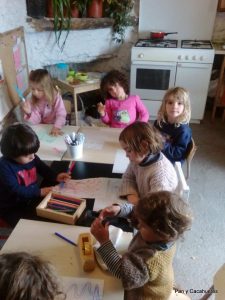Our eldest group of children are now approaching seven years old, at which time society is putting a lot of pressure on intellectual development.
That said, observation has shown us that such a development stems from the natural interest of children. On the other hand, we know from science that, from a neuronal point of view, the development of psychomotor skills precedes the development of the intellectual skills, which occurs in a context of fulfilling social interactions.
The physical body, the emotions and the thought develop in parallel, at their own pace and following impulses so mysterious that it is worth taking time to observe and admire these developments, rather than trying to control them.
At this stage, we should not focus our attention on the intellect only. We still have to continue accompanying the childrens’ cognitive development processes based on concrete, experiential and interaction experiences, until they reach adolescence. Therefore, we will focus our attention on the multiplication of the social needs they have at these ages and on the need for cultural absorption from the closest contexts (the Alpujarra nature and society, numbers, letters …) up until their opening to the world.

In fact, we could say that a key aspect of our intervention with children between 3 and 6 years old is to respect their egocentricity so that they can feel their own will, “I am, I want”.
Then, from 6 to 12 years, it is our responsibility to create the necessary spaces (free play for children, weekly assembly for the teaching team) to foster the development of empathy, “I want, what do you want, what can we create together? “.
It is hard to imagine the number of experiences needed to get in other person’s shoes and to accommodate everyone’s desires for the benefit of the relationship. In the escuelita, we have the privilege of observing on a daily basis how this process occurs naturally in 3-4 year-old children.
This ability we have to accompany children in their interactions with their peers, and to observe the incredible value they give to time, to listening to each other and to resolving conflicts without the need for a directive intervention on our part, represents a true journey to the heart of human essence.
On the basis of these premises, we wish to continue to accompany our children towards a “non-directive” primary school, which gives a privileged place to cooperation, dialogue, experimentation and discovery by oneself, rather than the accumulation of knowledge from a master, by creating a climate of empathy and confidence in the ability of children to be autonomous and responsible.

More about us:
<—